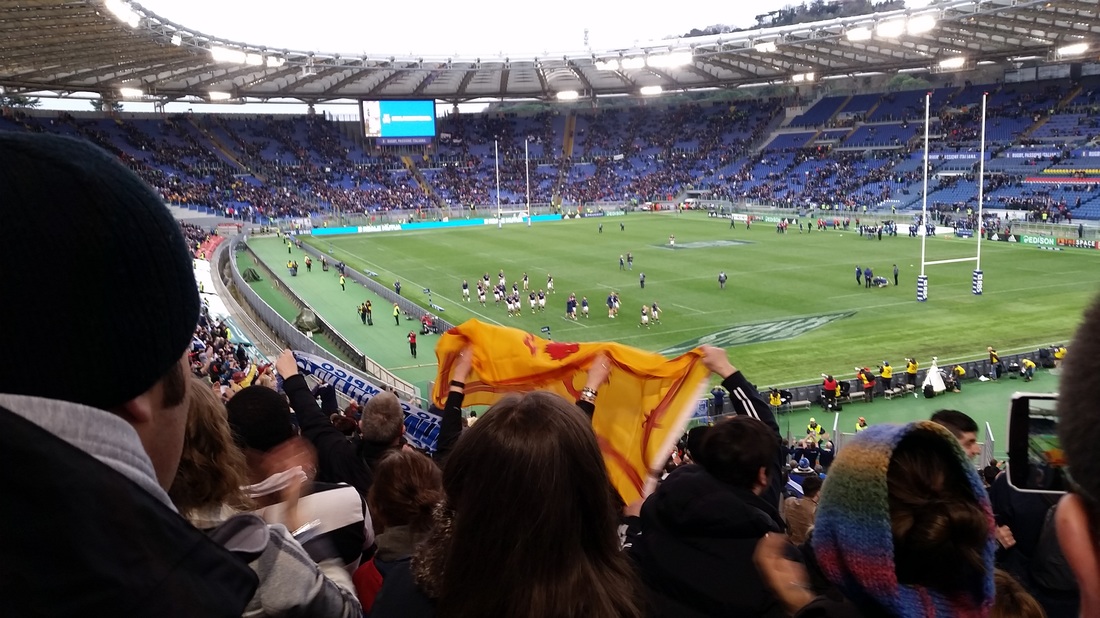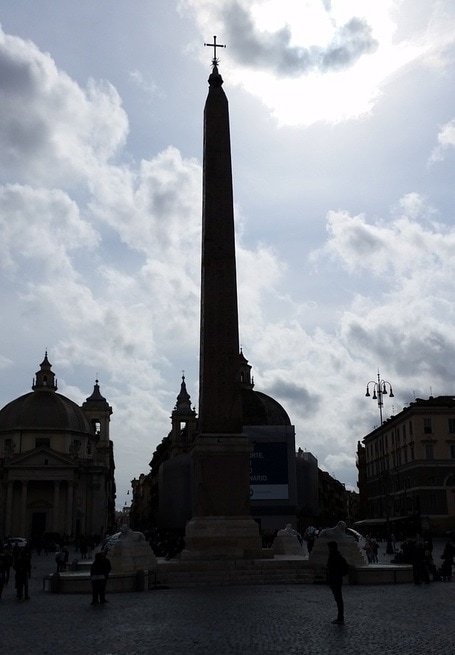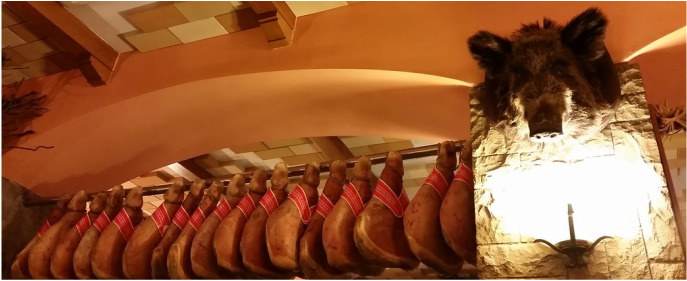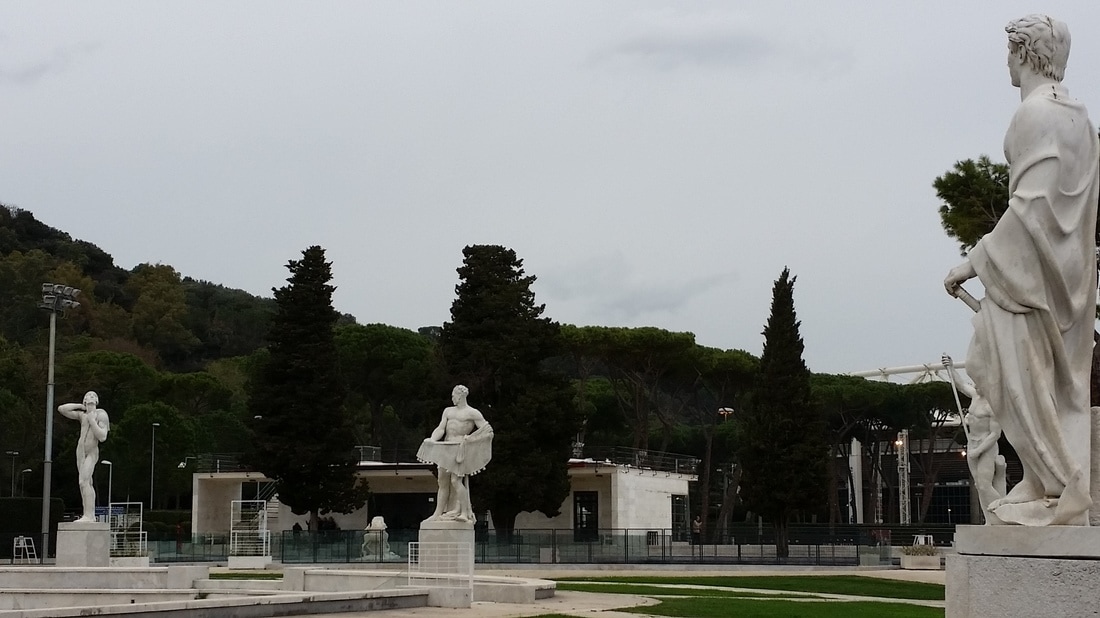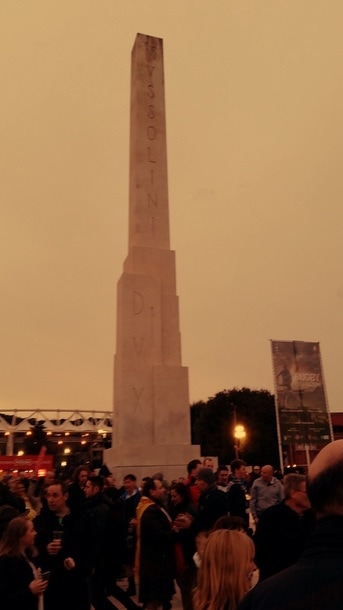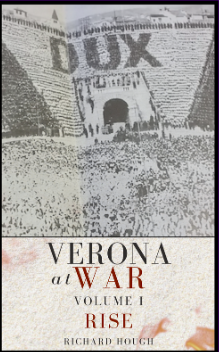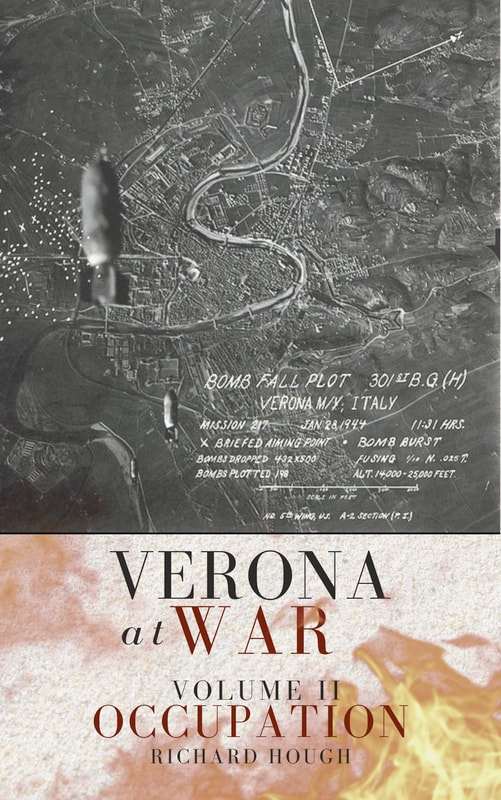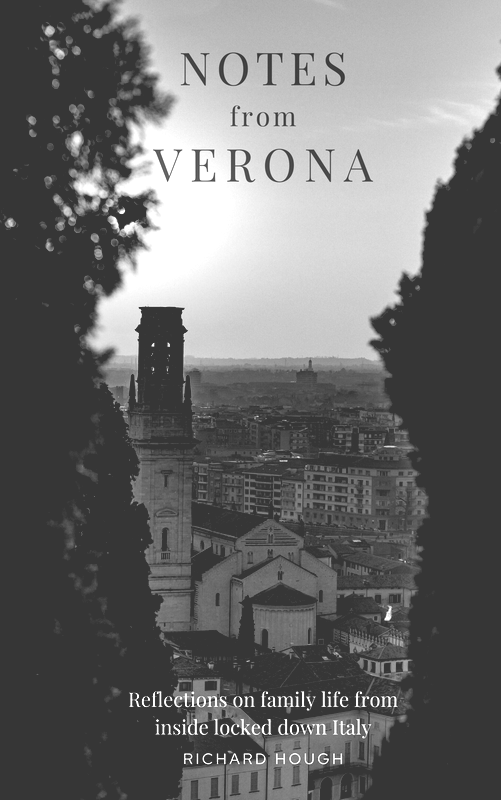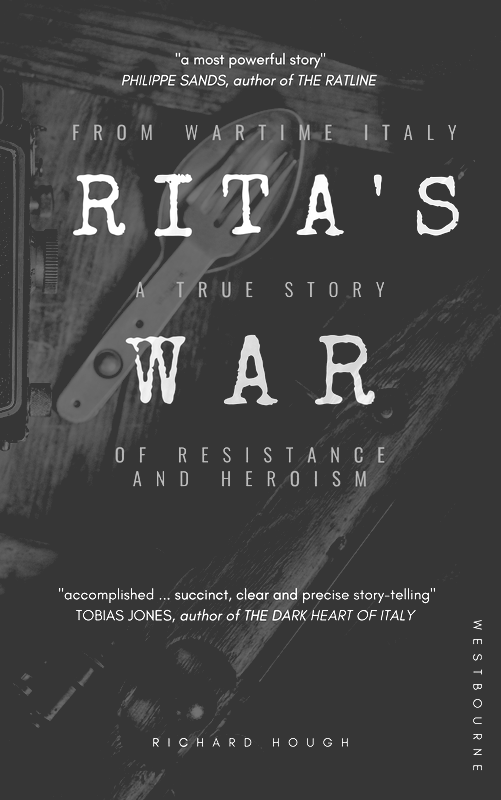|
For the Euro 2016 group stage tie between Ireland and Italy I travelled from Verona to Lille with the Azzuri. With the Irish desperate for a victory to progress, it was a match and a party I'll never forget! On 1 January 2016, an ex-student of mine, a proud Veronese with a curious west coast drawl, sent me a message to ask if I'd be interested in going to France for the Italy v Ireland game. I could hardly say no. Of course, at this stage he didn't actually have the tickets and the chances of getting them in the ballot seemed remote, so it was more in hope than in expectation that I accepted his kind offer.
I'd long ago promised myself that I would attend the next major tournament that Scotland qualified for (regardless of venue), but with the prospects of Scotland qualifying for a tournament about as likely as bumping into a sober Irishman on the streets of France this weekend, I decided to throw my lot in with the Italians. In truth, I was a bit doubtful about supporting a 'foreign' nation and going 'on tour' with anyone other than my close friends and compatriots, but I'd been living in Italy for nearly five years, my wife is half-Italian, my youngest son was born in Verona and I never drink a cappuccino after 11. Maybe it was time to unleash the Italian in me! Well, match day finally arrived and, like all good away trips, this one started in a motorway tollbooth car park. The Verona North junction of the E45 (a remarkable motorway that somehow connects Karesuando in Sweden with Gela in Sicily) is a fairly surreal place to be at 6.45 am on a Wednesday morning, but it was here I had arranged to be picked up for the first leg of the journey from Verona to Lille. Being British, I arrived early. Being Italian, my lift arrived late. Not to worry, we were soon speeding south, our somewhat circuitous route taking us first to Bologna, then north by plane to Paris, before the final leg of the journey by train to French Flanders on the border with Belgium. My companions for the trip were: 'Gelme', an in-house lawyer for an Italian I.T. service provider, from the famous wine-making region of Valpolicella, he nonetheless has a healthy appetite for the beer and, as a former Erasmus student, a remarkable penchant for cultivating cross-border friendships. On a previous European adventure (Poland 2012), he had befriended some Irish fans who were in a neighbouring campervan and he has successfully nurtured this friendship over the years, offering warm hospitality in his native Verona in exchange for an eye-opening 'cultural exchange' to the Emerald Isle. "Il Capo", another native of Verona, lifelong Milan fan and loyal season ticket holder. Short, fit and well presented, an eye for the ladies and a quiet determination that somehow ensured that at 3.00am on Thursday morning, when the chances of navigating through the walls of Irish, six deep at every bar in the city, seemed all but impossible, he gleefully returned with 4 pints, giving our dwindling spirits the much needed kick in the arse that would see us through until dawn. Gian, a cultured and thoughtful businessman from Torino, he bought with him a book about two 19th century Italian prostitutes, which he absorbed in the quieter moments of the trip. Arriving at Bologna airport at around 10.00am, my thoughts quite obviously turned to beer. My companions, however, were more interested in the motorbike on display in the Ducati shop. A chance encounter with a dapper but surly Andrea Mandorlini, the manager of Hellas Verona who had been dismissed in November 2015 after an incredible run of bad form which would eventually culminate in the club being relegated, added a sense of occasion to proceedings, and before long we were boarding the short Air France flight to Paris. We barely had time to quaff a can of Heineken (or in the case of my Italian companions, a continental fruit juice) before we were descending into Paris GDG). At Paris we got our first taste of what was to come over the next couple of days. The Irish were immediately obvious with their green jerseys and propensity to congregate at the nearest bar. They were without exception unfailingly quick to strike up a conversation (usually a twinkle-eyed request that we let them win). Nothing, I soon realised, confuses an Irishman like an Italian with a Scottish accent. An explanation of my origins and background added another dimension to our conversations, with some inevitable good natured ribbing of the luckless Scots who, by comment consent, were unfortunate not to have qualified for the tournament, having taken four points from their encounters with the Irish. Italy had already eased into the knock-out phase of the tournament as group leaders with two emphatic victories (against pre-tournament favourites Belgium and Ibrahimović-led Sweden). The ease with which the Italian side has reached the knock-out phase has surprised many, but for Ireland, a win was necessary to proceed to the knock-out stages. With Antonio Conte taking the opportunity to rotate his squad, resting key players like Buffon, Chiellini and De Rossi, and giving Paris Saint-Germain goalie Salvatore Sirigu and West Ham defender Angelo Ogbonna rare starts, Ireland were in with a chance. On arrival in Lille, a beautiful old town with classic Flemish architecture and a vibrant city centre, it was immediately clear that the Irish had taken over the entire city. Every single bar, street and piazza was overflowing with singing, dancing, drunken Irishmen. We soon met Gelme's old Irish friends from his previous expeditions and, as a small group of Italians, we were warmly embraced as we joined the army of Irish fans who were already in high spirits. As thousands upon thousands of drunk and boisterous Irish boarded the metro trains to the stadium, I found myself in a compartment opposite a north African family, including a baby in arms. A visibly nervous looking woman in a hijab also occupied a discreet corner of the carriage. As the carriage quickly filled to bursting point, there was a moment of anxiety for those who had unwittingly found themselves caught up in this Irish exodus from central Lille to the city's stadium. They need not have worried. The friendly Irish quickly introduced themselves to their fellow passengers, fussing over the children and even showing-off mobile phone pictures of their own kids to the somewhat bemused passengers. The match itself might not have been a classic (in fact, after one-too-many of the stadium's low-alcohol sleep inducing lagers, one of our number actually fell asleep during the first half), but the spectacle was unforgettable, particularly in the second half when it reached its incredible climax. I'll never forget the haunting lyrics of the Fields of Athenry echoing around the stadium and the utter hysteria as Robert Brady scored the late winner that would take Ireland through to the next round, nor the far away stand, a bouncing, delirious sea of green, while the Irish players desperately fought to cling on to their slender lead. It was almost too much for the row of young Irish in front of me who could barely contain themselves in the minutes before the final whistle. You would be hard pressed to find a single Italian who would begrudge the Irish their victory. Indeed, in the post match hysteria, I caught a fleeting glimpse on the stadium's big screen of Gigi Buffon, the classy Italian goalkeeper, embracing Martin O'Neil with a genuine enthusiasm that would epitomize the Italian feelings towards the Irish. In the days, months and years to come, when people ask me what I remember about Euro 2016, it will be enough to say: I was in Lille with the Irish. From an organisational perspective, getting back to the city centre after the match was a frustrating experience and, in different circumstances, frustration could have spilled over into something uglier. The Irish, however, accepted their plight in the same way as they faced everything else - with good humour and song. When a couple of hours later we eventually boarded the metro that would take us back to the city centre, we were treated to a drunken but spirited rendition of some old Irish folk songs. And this is the remarkable thing about the Irish travelling army. They come not to conquer or to fight or to display their superiority. They themselves know all about being an oppressed minority, they understand the pain of intolerance and the plight of the migrant. They follow their football team with an unrivalled joy and alcohol-induced passion, but I can honestly say that I didn't hear a single racist, sexist or homophobic remark, which in the context of such a huge group of travelling football fans is quite remarkable and which, by the way, is in stark contrast to the language of the Italian fans, whose conversation is peppered with a casual but virulent racism that would make Nigel Farage blush. In fact, in my time in Lille I don't think I even heard an Irishman so much as swear! I happened to mention this to an Irish lad I found myself speaking to in the early of Thursday morning. "We're no angels" he confessed, "but when we come abroad we just want to make friends and do our country proud". In France this summer they have certainly done that, both on and off the pitch. But while few fancy their chances against the host nation on Sunday afternoon, fewer still would begrudge them another moment of glory. This short article recalls an unforgettable football match at the incomparable "Stadium by the old forester's house" (Stadion An der Alten Försterei) of FC Union Berlin. It is the third in a series of short articles about Berlin. See also A weekend in Berlin and A bike tour through Stasiland,. For football fans visiting Berlin, the obvious impulse is to go to the cavernous Olympic Stadium and see Hertha Berlin, the city's most famous club (currently behind only Bayern Munich and Borussia Dortmund in the German Bundesliga). Indeed, I did the same myself on a previous visit.
But, for a more fulfilling experience, you would be better advised to head out of town to the forrest of Köpenick. Here you will find the Stadion An der Alten Försterei, home of FC Union Berlin. Playing in the German second tier, there is nothing second division about the atmosphere inside the ground. With only 3,500 seats in a stadium with a capacity of a little over 22,000, the place was literarily bouncing. It's a stadium purpose built for football, with no athletics track to create a gap between the fans and the action. The stadium hosts a stunning annual christmas carol service (Weihnachtssingen 2015) and in 2014 the club allowed fans to bring their own sofas to the ground to watch World Cup matches on the stadium's big screens (Fans leap off the sofa at 5-0 lead over Brazil)! The match I saw wasn't half bad either. A three-one victory over a well supported TSV Eintracht Braunschweig side, including a goal by promising young Hawaiin striker Bobby Wood (who Liverpool are reportedly following closely), and a brace from Croatian midfielder Damir Kreilach. Everyone in the stadium was on their feet for the entire match. The singing, chanting and drumming didn't relent for a single moment, creating an unforgettable atmosphere. With beer available from roaming vendors and barbecued steak burgers on sale at half-time, supporting FC Union Berlin was a truly memorable way to spend a fantastic evening in the German capital! As we begin to look forward to the next round of the Six Nations matches, I thought I'd take the opportunity to look back at my recent visit to Rome, which included the annual "Wooden spoon decider" between Scotland and Italy. I had taken the early morning train from Verona and was in Rome by 10.30 am. As the persistent rain showed no signs of abating, I quickly dropped my bags off at one of the many budget hotels near the station and was soon on my way towards Piazza del Popolo, the large urban square to the north of the historic centre that was the muster point for many Scottish fans heading to the game. By now the rain had stopped and, coming from the sub-alpine conditions of the north to the temperate subtropical mediterranean climate of Rome, I was beginning to feel rather overdressed. Most of my compatriots were far more suitably attired in short-sleeved rugby tops and kilts. My companions for the day were all long-standing veterans on the international rugby circuit and, I'm pleased to say, brought their cumulative experience to bear on proceedings. They had made reservations at ristorante pizzeria “Il Vignola", which was as authentic a taste of Rome as I have ever experienced - including the famous pasta cacio e pepe (on previous visits I had usually settled for the standard tourist fare to be found in the historic centre). The food, wine, beer, service and company were all first class. The perfect prelude to the match. Il Vignola had the added benefit of being almost equidistant between Piazza del Popolo and Stadio Olympico (I told you these guys were good). Suitably refreshed we made our way the short distance to the stadium - the magnificent Stadio Olympico. There was a real carnival atmosphere in the area surrounding the stadium (the magnificent Foro Italico), with marquees, bars and entertainment for the nearly 70,000 fans who were by now flooding through the security perimeter. Although I vaguely remembered reading something about the fascist origins of this magnificent sporting complex, the details, like my general state after such an indulgent lunch, were somewhat hazy. Hazy or not, the tell-tale signs of fascist era architecture were striking. Simple but grandiose, Foro Italico, Rome's magnificent sports complex, is littered with 15 foot tall marble sculptures depicting muscular Italian athletes in various semi-erotic (to me anyway) poses. Fascist architects in the 1920s and 1930s drew inspiration from classical Roman buildings, but while Roman design has ornate details and rounded edges, fascist buildings are generally cold and forbidding. Symmetry, straight lines and simplicity were the order of the day. The ancillary buildings surrounding the stadium were designed in exactly this way. Foro Italico was originally known as Foro Mussolini. Inspired by the Roman forums of the imperial age, it was designed by Enrico Del Debbio and, later, Luigi Moretti. Built between 1928 and 1938, it remains one of the preeminent examples of Italian fascist era architecture. The match itself passed in a bit of a blur - something to do with a never-ending hip flask of whisky and the proximity of the in-stadium bar. For the record, Scotland won 36-20, ending a ten-game losing streak and, in the process, racked up the most points they have scored in a single Six Nations match. Flooding out of the stadium after the game, most fans seemed oblivious to the significance of the 50-foot obelisk that bears the inscription “Mussolini Dux”. It is the world's greatest surviving monument to the fascist dictator. While some may argue that such monuments have no place in modern sport, I rather enjoyed my afternoon in Rome's playground built by fascists. I would even go as far as to say that I appreciated the aesthetic beauty and efficient functionality of the Foro. The Mussolini Obelix, more than anything else, stands as a lasting reminder of the perils of fascism and the tragic absurdity of its vainglorious leader. Click here to read more about the dark history of Rome's Stadio Olympico with the Gentleman Ultra.
|
AboutRichard Hough writes about history, football, wine, whisky, culture + travel and is currently working on a trilogy about wartime Verona.
|
